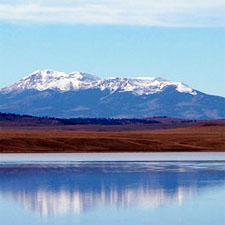Drought, Climate Change, Water Institutions and Society
Since 2002 the Center has undertaken a series of Western Water Assessment-funded projects focused on drought, climate change, and water institutions. In its "Impact of Earlier Spring Snowmelt on Water Rights and Administration" project the Center examined whether the growing mismatch between seasonal water rights and earlier runoff in the Intermountain West has resulted in conflict between supply and demand. Earlier work analyzed the drought coping mechanisms of several Colorado Front Range water providers.
Kenney, D., C. Goemans, B. Klein, J. Lowrey, and K. Reidy, (2007). Residential Water Demand Management in Aurora: Learning from the Drought Crisis. Colorado Water 14 (16).
Kenney, D.S., C. Goemans, R. Klein, J. Lowrey, and K. Reidy (2008). Residential water demand management: Lessons from Aurora, Colorado. J. Am. Water Resour. Assoc. 44 (1) 192-207, issn: 1093-474X, ids: 258CT, doi: 10.1111/j.1752-1688.2007.00147.x.
Kenney, D., R. Klein, and C. Goemans (2009). Preliminary Findings from Western Water Assessment’s “Water Rights and Climate Change Project'. Intermountain West Climate Summary 5 (2).
Kenney, D., R. Klein, C. Goemans, C. Alvord, and J. Shapiro (2008). The Impact of Earlier Spring Snowmelt on Water Rights and Administration: A Preliminary Overview of Issues and Circumstances in the Western States. Final Project Report (review draft): September 3.
Kenney, D.S., R.A. Klein, and M. Clark (2004). Use and effectiveness of municipal water restrictions during drought in Colorado. J. Am. Water Resour. Assoc. 40 (1) 77-87, Times Cited: 7, issn: 1093-474X, ids: 808TG.
Klein, R., D.S. Kenney, J. Lowrey, and C. Goemans (2006). Factors influencing residential water demand: A review of the literature, 44 pp.
Klein, R. and B. Udall (2004). 2008 Colorado Drought Impact Report: A Report to the Governor. Natural Hazards Observer 28/July , 2 pp.

